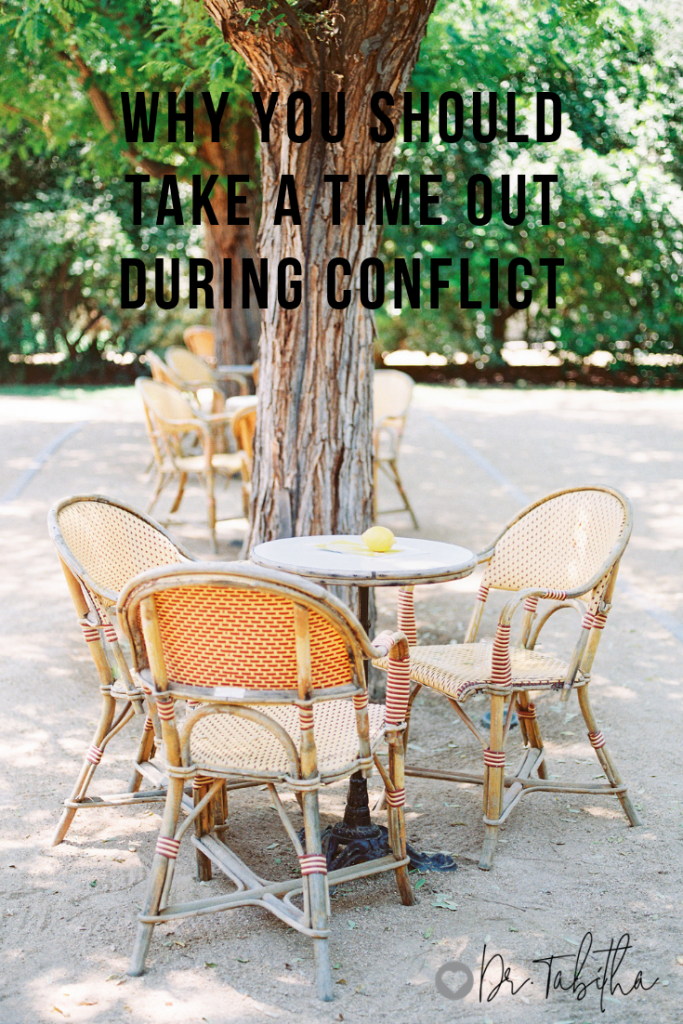
If you are a parent (and even if you’re not) it’s likely you know what a time out is. What about for adults? When would that be appropriate? For some individuals the need for a time out during conflict comes as a necessary tool to help with anger management. For couples it may be used as a tool to prevent having an explosive argument or shutting the other person out in anger. Recognizing the need for a time out during conflict is very important and can help prevent irreparable damage in your relationships.
Taking a time out can seem like a childish task, but it can be useful in most heightened emotional states to help calm down and readdress the issue in a productive way. When that anger starts to rise it’s important to have a plan in place to help manage and calm yourself down.
5 Ways To Take A Time Out During Conflict
Check in with yourself.
Recognize where you are (both physical location and emotional). Is your heart beating fast, is your voice escalating, are your feelings getting more intense? Think about what emotional or physical symptoms you have that indicate a need for a time out. There will come a time in a conflict where your emotions inside build up and turn outwardly. A conflict can become heated and nasty, using criticism, sarcasm, name-calling and more. So taking a time out during conflict can not only protect the other person you may care about, but protect yourself from losing control.
Communicate the need for a time-out.
The need for a time out comes before the “flight or fight” response is triggered. It is easier to hold yourself accountable when the other person is aware of your needs. It is important to have this conversation before an argument occurs, if possible. If not, express it in a respectful way. You might say something like this: “Sometimes when we disagree, I can get too emotionally overwhelmed, so I may need to give myself a time out to calm down, so that we can continue the talk in a productive way”. Having this conversation before a fight happens, will help the other person avoid feeling neglected or “walked out on” in the conflict.
Create and discuss the terms.
Discuss what a time out during conflict will look like and hold yourself to it. Part of the conversation of expressing the need for a time out is explaining and agreeing on what that time out will look like.
Set a time limit.
It will help the other person feel respected rather than dismissed. It will also help you stay accountable and prevent the “sweeping it under the rug” tactic. The time limit should be the amount of time it takes to deescalate your intense emotions. This can be shorter or longer depending on the issue and the person but a general rule of thumb is that you should always come back to the issue to discuss within 24 hours.
Discuss what you will be doing.
Maybe taking a walk or a jog will calm you down. Maybe you need to get lost in a book for 30 minutes. Whether it is walking, reading, praying, or yoga; do something that helps you calm down and helps you recover from your emotional intensity. Let your partner know before there is conflict what type of things help you calm down. Otherwise they might feel like you blew them off to go to yoga with your friends.
Commit to processing the emotions.
The purpose for a time out during conflict is to process your own emotions while reflecting on why the time out was needed. In this moment you may identify what triggered you and how you were feeling. Think in “I” statements. The ability to avoid blaming language is a big step in having a healthy conversation after the time out. Try to spend a moment reflecting on the other person’s point of view. Perhaps you don’t agree with them but you can likely understand where they are coming from if you try.
Request the need for a time out during conflict.
Now that your partner knows you may sometimes need a time out during conflict, it is important to recognize your symptoms and request the time out. Calling a time out for yourself is not as easy in the moment as it may seem, but it is very important to call it for yourself. Think about it in this way, how often does it work when you tell someone, “You need to calm down” or “You need a time out.” That probably wouldn’t go over so well. It is much more helpful to be aware of your own triggers and emotions.
Continue the Conversation.
Returning to a tense discussion can seem scary or make you feel vulnerable, because there’s a fear that things will escalate again. Resuming the conversation after the time limit has been reached is a huge step toward conflict resolution. Now that your emotions have calmed, resuming the conversation will show that you are committed to working things out. In this time, remember to be assertive, speak for yourself (without blaming language), listen intently, and be respectful to the other person’s emotions.
Anger management is one of the most commonly sought after therapy techniques for individuals. It is important to note that whether it is expressed or not, anger doesn’t just go away. Taking a time out during conflict can help manage anger in a healthy way. Taking a time out during conflict can be useful with calming down the emotional intensity of an argument. Coming back to a difficult topic later can help you avoid the “sweeping things under the rug” tendency that leads to resentment. It also helps you feel good about yourself knowing you successfully returned to an issue that previously would have caused you to shut down or explode and had a productive conversation instead.
If you are struggling with managing your emotions when things escalate or you think you could benefit from time outs during conflict, I highly recommend John Gottman’s book “The 7 Principals for Making Marriage Work.” If you’d like to join me on our 2019 Luxe Couples Retreat, we spend a whole day focusing on your conflict cycle and healthy ways to manage difficult emotions and conflict. I’d love to see you there!






Leave a Reply
Your email is safe with us.